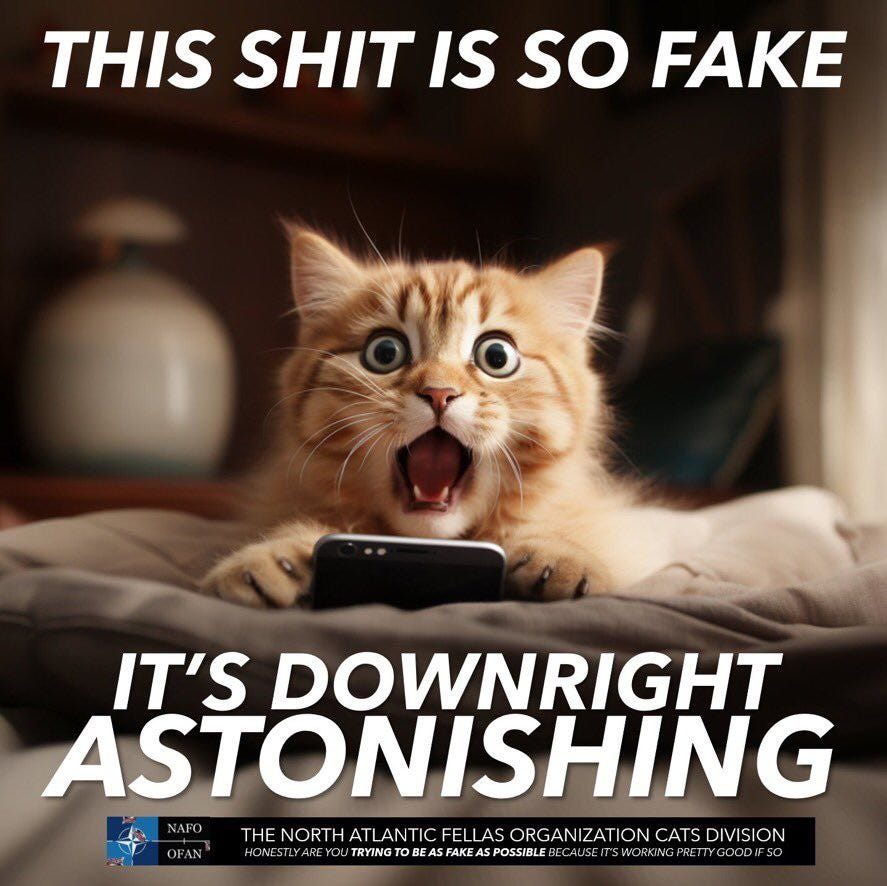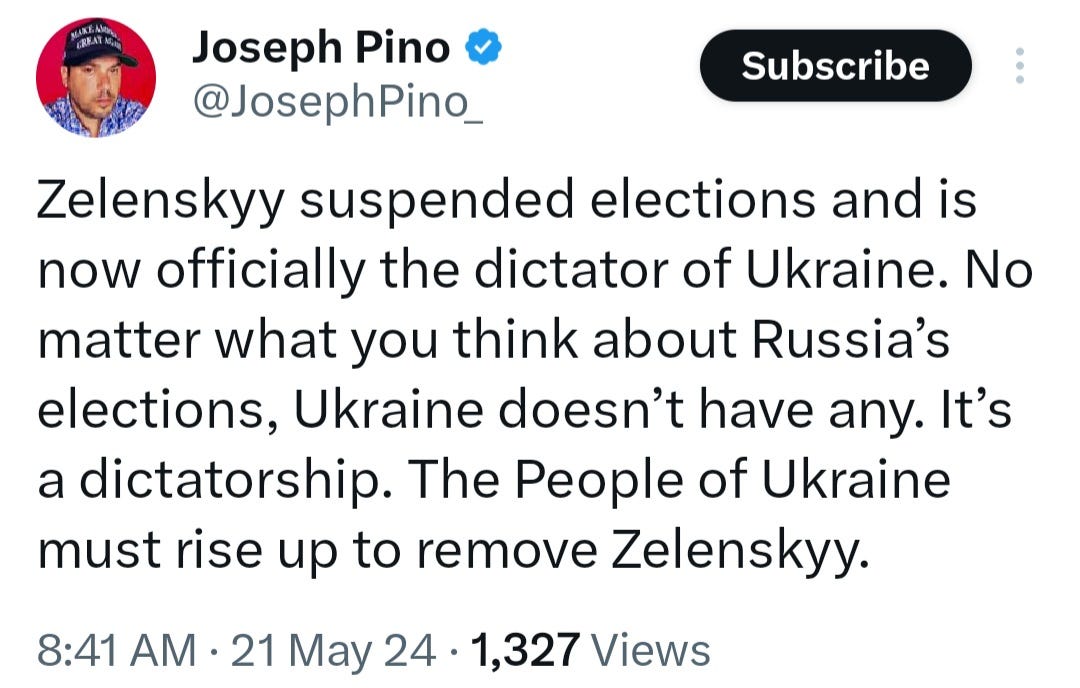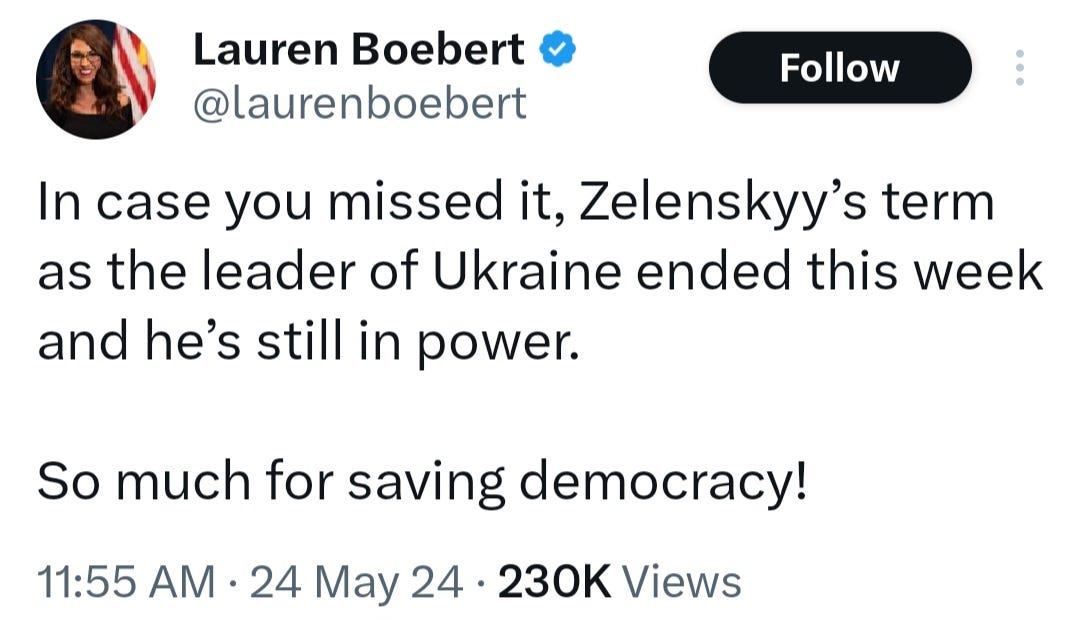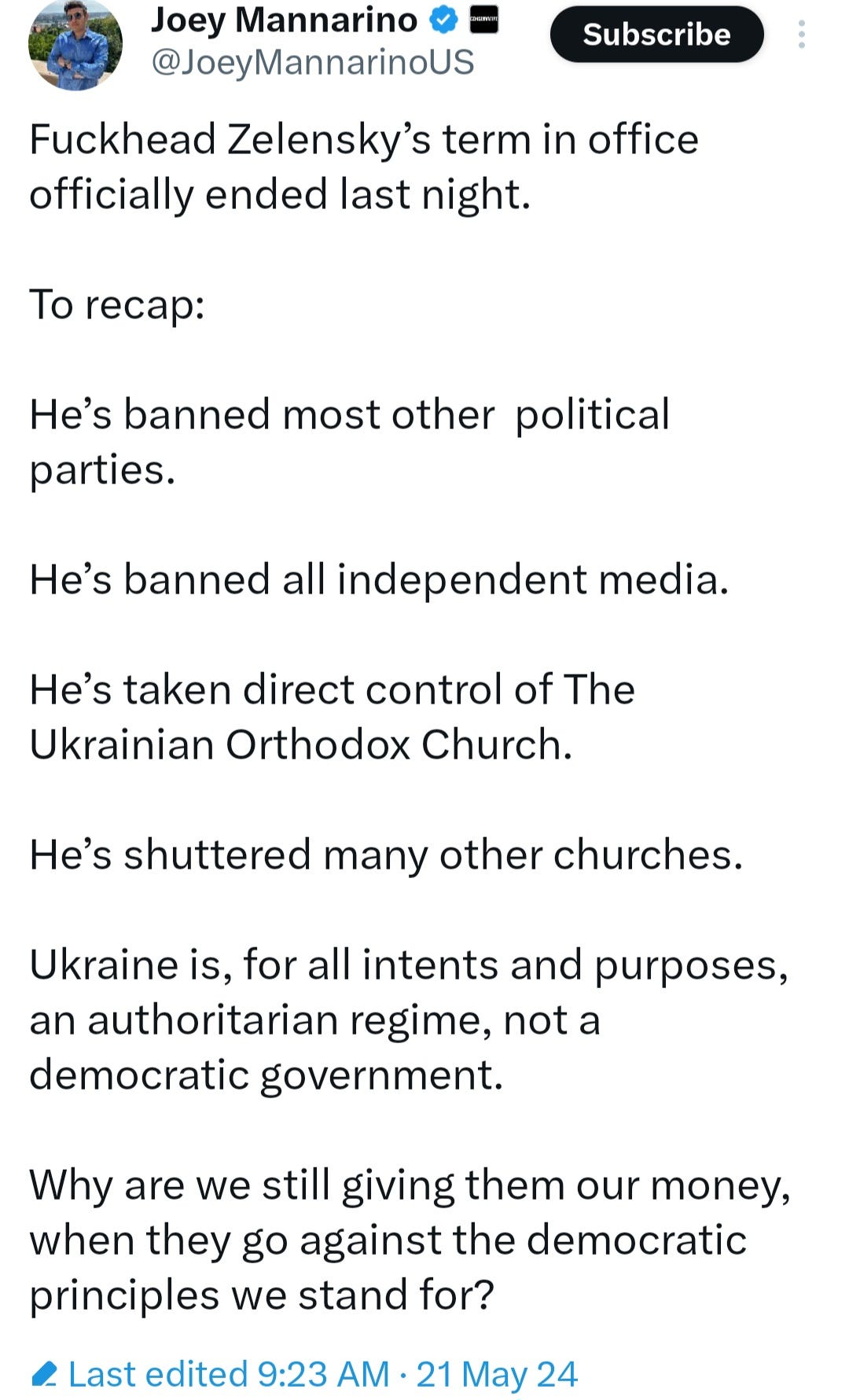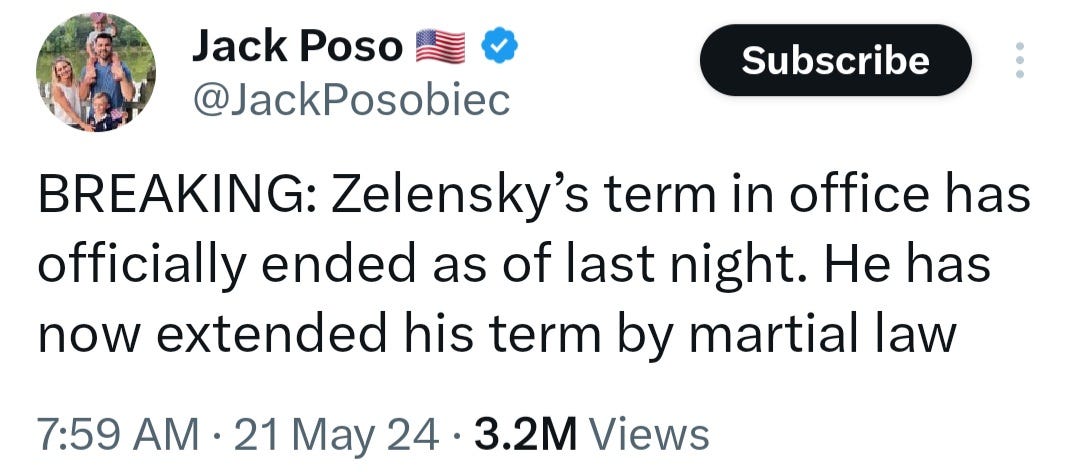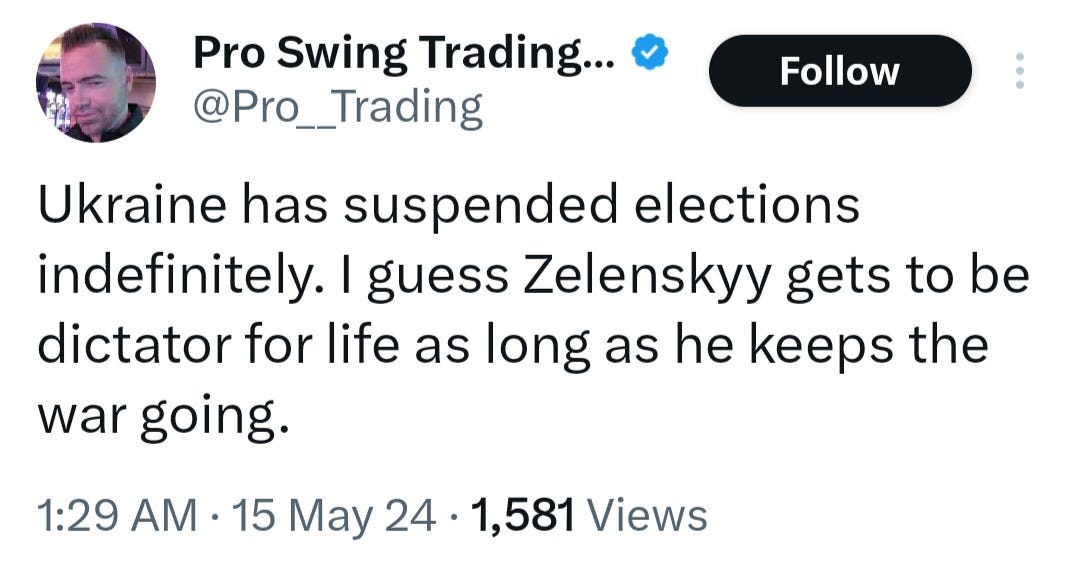Did You Hear That President Zelenskyy is Now a Dictator and His Wife Goes on $1 Million Jewelry Shopping Sprees?
It's yet another example of Kremlin propaganda
If you’re relatively new to the issues related to Kremlin propaganda and how it’s affecting other countries (including the United States), I recommend reading some background posts I wrote that explains things in more detail along with links to other sites where you can read more to educate yourself.
In 2019 an actor and comedian named Volodymyr Zelenskyy decided to parlay the role he played on the Ukrainian TV show Servant of the People into real life by running for president of Ukraine. In peaceful times his term would've ended this week, there would've been elections and the Ukrainian people would've decided whether President Zelenskyy deserved a second term or not.
These aren't normal times. Russia is trying to conquer Ukraine and no elections were held as a result. Right now President Zelenskyy is staying in office for the forseeable future. Of course it has led to Putin sympathesizers making posts like these accusing Volodymyr Zelenskyy of being a dictator.
Many of these people who are hurling the dictator accusation at Zelenskyy are also supporters of Donald Trump, who have said that he plans to rule as a dictator if he is reelected. Plus they support Vladimir Putin, who is definitely an authoritarian dictator.
They claim that it's not very democratic to stay in office beyond a certain date under the guise of martial law. But is it? To figure this out, let's go to the Ukrainian constitution.
Article 103 of the Ukrainian constitution says that the president is elected for a five-year term and the same person can serve no more than two terms as president.
If we were to go just by that one article alone, we could say that Zelenskyy's detractors have a point. But there's more to the Ukrainian constitution.
Article 85 of the Ukrainian constitution says that the Verkhovna Rada (the Ukrainian equivalent of congress or parliament) has the authority to designate the elections of the President of Ukraine and declaring war upon the submission of the President of Ukraine and concluding peace, approving the decision of the President of Ukraine on the use of the Armed Forces of Ukraine and other military formations in the event of armed aggression against Ukraine, confirming, within two days from the moment of the address by the President of Ukraine, decrees on the introduction of martial law or of a state of emergency in Ukraine or in its particular areas, on total or partial mobilisation, and on the announcement of particular areas as zones of an ecological emergency situation. (And those are just a few of the things that are in Article 85.)
Article 64 has this to say about martial law.
Under conditions of martial law or a state of emergency, specific restrictions on rights and freedoms may be established with the indication of the period of effectiveness of these restrictions. The rights and freedoms envisaged in Articles 24 [the rights and equality of women], 25 [citizenship of Ukraine and protection of Ukrainian citizens beyond its borders], 27 [everyone has the inalienable right to life], 28 [protection against torture and unauthorized medical experiments], 29 [the rights of those arrested on criminal charges], 40 [the right to petition the government], 47 [housing is a human right], 51 [the rights of marriage and the family], 52 [the rights of children], 55 [the right of appeal], 56 [the right to compensation for damages resulting from unlawful actions of the State], 57 [everyone has the right to know about their legal rights and duties], 58 [person cannot be tried for committing an act that was legal at the time but has since been outlawed], 59 [every accused person has the right to a legal defense], 60 [protection from a criminal ruling], 61 [person is protected from double jeopardy—being tried twice for the same crime], 62 [an accused person is innocent until proven guilty] and 63 [the rights of people who are either accused or convicted of a crime] of this Constitution shall not be restricted.
Basically certain freedoms (such as scheduling of elections and the length of a president's term) can be curtailed with the exceptions of the other articles that deal with a person's personal human right.
In a nutshell the Verkhovna Rada authorized martial law, which President Zelenskyy signed. This martial law was created and imposed in response to the Russian invasion of Ukraine. The martial law won't be repealed as long as Russian troops remain in Ukraine. When the war ends the Verkhovna Rada and President Zelenskyy will together authorize the end of martial law.
The detractors like to make the point that the US held its elections in 1944 during wartime. While it's true that the US still held its elections during World War II, keep in mind that the US was relatively unscathed in that war (with the exception of Pearl Harbor) so the elections could still be held safely and in an orderly way. The same can't be said for Ukraine, which has to endure frequent bombings and having a sizeable part of its territory occupied by Russia.
A better comparison with Ukraine would be the United Kingdom, which endured the Blitzkrieg bombing over several of its major cities. All elections ceased in that country after 1935 until Allied victory was assured via acts of Parliament. The next British elections were finally held two months after World War II ended in 1945.
If you want to see democracy return to Ukraine with free and fair elections, you'll need to demand that Vladimir Putin end his war and withdraw all of his troops from Ukraine (including the occupied areas of Crimea and the Donbass region).
Meanwhile, during a visit with the leader of Belarus, Alexander Lukashenko, Vladimir Putin began to question Volodymyr Zelenskyy's legitimacy as the president of Ukraine, citing the fact that the regularly scheduled elections in Ukraine have been suspended. Not only has Putin ignored the fact that the elections can't be held because Ukraine is currently at war with Russia but, as I previously mentioned in this post about propaganda and how it works, this is a classic case of Projectionism (also known as Accusation in a Mirror)—you accuse the other side of doing something that you're guilty of doing yourself. Putin recently won reelection in a vote that was widely derided in the West as a sham. Putin accuses Zelenskyy of being an “illegitimate” leader when one could easily question the legitimacy of Putin's own reelection.
The Kremlin was responsible for creating and spreading this debunked story about the mother-in-law of President Zelenskyy buying this luxury villa in Egypt's upscale Red Sea resort town of El Gouna using her son-in-law's ill-gotten wealth that was looted from Ukraine.
Then there is President Zelenskyy's wife and Ukrainian First Lady Olena Zelenska. There are accusations that she had spent $1 million dollars on jewelry at Cartier in New York City. It sounds outrageous until you learn about the sources of that story. Lately Russia has been reaching out to many African countries and—wouldn't you know it?—many of those stories of Zelenska's alleged million dollar jewelry shopping spree came from that continent.
This video has the details about the Egyptian villa and Cartier jewelry.
My blog is free to subscribe but if you want to make a comment, you’ll need to take out a paid subscription. Click on the button below for more details.





